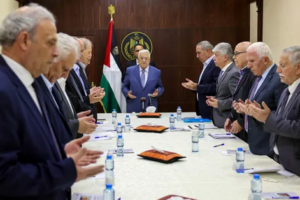The Palestinian Authority seeks to rule Gaza: Can it succeed?

A meeting of the PLO’s Executive Committee, June 2024
Robert Inlakesh writes in The Palestine Chronicle on 22 January 2025:
Upon the Gaza ceasefire deal’s ratification by the Israeli Cabinet on January 17, the Palestinian Authority (PA)’s President, Mahmoud Abbas, released a statement proclaiming that preparations had been made to “assume full responsibility in Gaza”. The likelihood of this occurring remains low, however.
Since the beginning of the Gaza Genocide the Palestinian Authority (PA) has been sitting on the sidelines, attempting to weave itself into a potential day-after settlement.
The idea of handing over the Gaza Strip to the Fatah-led PA – that currently maintains partial administrative/security control over a portion of the occupied West Bank – has been discussed between Hamas and PA officials for some time, without any tangible steps being taken towards its implementation.
For its part, the PA’s President, Mahmoud Abbas, has remained adamant that Hamas should not play a role in the governance of post-war Gaza, which has time and time again led to the collapse of reconciliation talks between the Ramallah-based authority and Hamas.
The latest round of talks took place in Egypt, close to the New Year, resulting in failure once again and leading to Cairo allowing dialogue on a hybrid form of Gaza governance, which would include roles from Gulf Arab countries.
So far there has been no confirmed model for Gaza’s future governance, although it has appeared that a US-Israeli-favoured technocratic administration, that receives foreign support and works without Hamas, is now prominent in the media discourse.
The Challenge of PA Governance
While a PA administration run out of the Gaza Strip could potentially offer some economic benefits to the beleaguered territory and help lift Western sanctions, therefore easing the Israeli siege, it also comes with a variety of complicating factors.
Hamas has been the administrative power inside of Gaza since 2006. This has meant that the civil society sector – which it had already been building prior to its victory in the legislative elections – along with the territory’s security apparatus, administrative staffers and anyone in positions of power within the territory, have either worked under de-facto Hamas rule or been members of the group.
Despite it being the cheap propaganda of the Israeli and Western corporate media to label the Gaza Health Ministry as “Hamas-run”, as it is staffed by healthcare professionals and not militants as the title lets on, the government under which it operated was a Hamas administration. Similar to how the Israeli Ministry of Health is under the rule of the Israeli government and the Palestinian Health Ministry in the West Bank operates under a PA administration.
What this means is that Hamas as a political party is always going to have ties to every sector in Gaza so long as it exists, even if this just means staffers who work in administrative roles. Purging experienced individuals who worked alongside Hamas, making them de-facto part of its administration, many of them without actually being its members, would be a catastrophe and would mean any new administration would have to be fully run by new and relatively inexperienced people.
